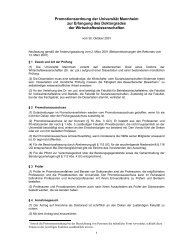Sommersemester 2006 - Abteilung Volkswirtschaftslehre der ...
Sommersemester 2006 - Abteilung Volkswirtschaftslehre der ...
Sommersemester 2006 - Abteilung Volkswirtschaftslehre der ...
Sie wollen auch ein ePaper? Erhöhen Sie die Reichweite Ihrer Titel.
YUMPU macht aus Druck-PDFs automatisch weboptimierte ePaper, die Google liebt.
GRADES:<br />
The grade for the course is based on active participation in class (30%) and the<br />
presentation of solutions to the case problems presented below, in form of four<br />
team papers (30 %), and the preparation of final slides on the case presentation,<br />
based on the discussion in class.<br />
CONCEPT OF THE COURSE SEQUENCE:<br />
The course sequence consists of three blocks. The four hour lecture course on<br />
strategic action I in the winter semester; a block seminar held either at the end of<br />
the winter semester or just before the beginning of the summer semester; and the<br />
present interactive four hour case study course held in the summer semester.<br />
Participation in both the seminar and the summer course necessitates participation<br />
in the winter semester course (or equivalent). Participation in the seminar is<br />
recommended, but not required for participation in the summer course.<br />
The philosophy that has led to the course sequence is the following: The analysis of<br />
a real life strategic planning problem necessitates the reduction of the problem to its<br />
essentials. The winter semester course is designed to equip the student with the<br />
tools relevant for the analysis of such strategic problems at the level of the firm, as<br />
well as the level of an industry. Depending on the industry structure, both are<br />
prerequisites for the analysis of regulatory and competition policy.<br />
Emphasis is placed not only on the reception of existing models but also on the<br />
generation of new ones that are appropriate for the analysis of specific real life<br />
problems. In contrast to the presentation of recipes, the winter semester course is<br />
designed towards to equip the student with micro theoretic and game theoretic tools<br />
to solve strategic problems.<br />
This concept is deepened within the block seminar and the case study course.<br />
Towards this we have developed a novel case study based interactive teaching<br />
concept that does not end with the student’s un<strong>der</strong>standing of the many existing<br />
modelling approaches, but continues with the development of specific models<br />
intended to give specific answers to specific strategic planning problems taken from<br />
current consulting experience.<br />
More specifically, in the block seminar held we ask the student to explain carefully<br />
selected case data with the theoretical approaches discussed in the winter<br />
semester course. In the present case study course the student is challenged with<br />
the development of new modelling approaches. Towards this, we present a<br />
sequence of five cases from different industries.<br />
We will form teams of students. The teams will compete against each other in<br />
developing answers to two strategic questions raised at the end of each case<br />
presentation. The first question will involve a decision problem for a key industrialist<br />
in the relevant industry; and the second one a regulatory or competition policy<br />
decision problem for that industry.<br />
LITERATURE:<br />
The main reference text for the course will be Tirole, J. (1989): The Theory of<br />
Industrial Organization, Cambridge, MA: MIT Press, German translation Oldenbourg<br />
(1994)<br />
19















